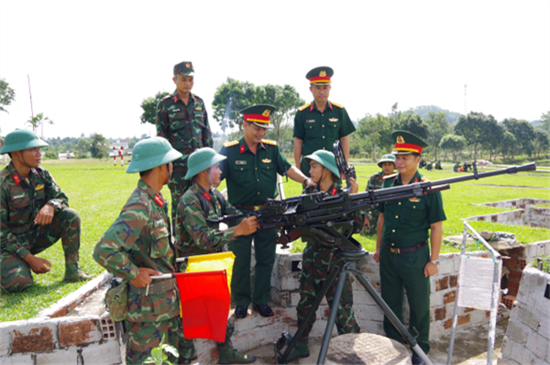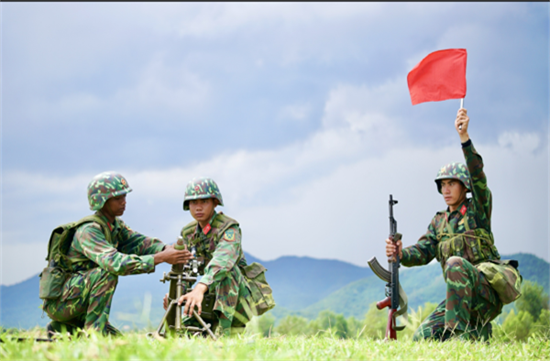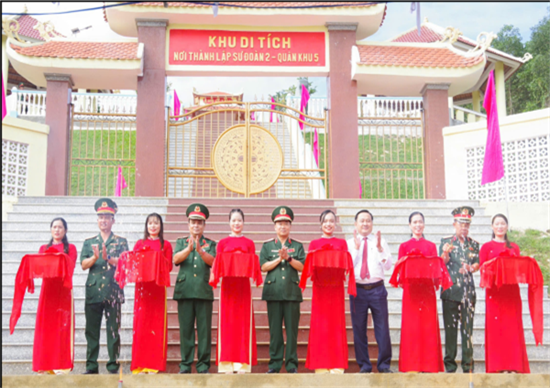Founded on 20 October 1965, Infantry Division 2 operates as a main-force unit, the “iron fist” of Military Region 5, earning numerous outstanding victories in the cause of liberating the South, reunifying the country, and building and defending the Fatherland.
Over the sixty years of its formation, combat, and growth, the fundamental principle and foremost lesson underpinning the Division’s success in fulfilling every assigned task is to maintain and strengthen the Party’s absolute and direct leadership in all aspects. In recent years, amidst the context of intertwined opportunities, difficulties, and challenges, the Division’s tasks have developed new dimensions. To uphold its role as the political nucleus and to lead the unit in successfully accomplishing all missions, the Division’s Party Committee has consistently prioritised Party building, with the aim of unceasingly enhancing leadership capacity and combat strength through resolute and effective measures.
 |
| Leader of the Division checks training of air defence squad |
Accordingly, the Division’s Party Committee has focused on consolidating and strengthening grassroots Party organisations to ensure they remain clean and strong. It has vigorously and effectively implemented groups of tasks and solutions in Party building and rectification, in close association with promoting the study and emulation of Ho Chi Minh’s thought, ethics, and style. This has contributed to building a Party Committee strong in politics, ideology, ethics, organisation, and cadre work, while resolutely preventing and repelling manifestations of political, ideological, moral, and lifestyle degradation, as well as the phenomena of “self-evolution” and “self-transformation” within its organisation. In parallel with thoroughly grasping and implementing resolutions, regulations, and guidelines on restructuring and streamlining the organisation and staffing towards “compact, lean, and strong” direction, the Division’s Party Committee has directed the merging, consolidation, and reorganisation of Party committees and organisations at all levels, ensuring rigour, unity, adherence to regulations, and suitability to each type of agency or unit, with adequate numbers and assured quality.
On the basis of comprehensive review and accurate assessment of Party committees and organisations, the consolidation of Party committees at all levels has been closely linked with cadre planning and the building of the leadership contingent, especially key leaders. Timely supplementation has been made where shortcomings were identified, with appropriate attention given to cadre structure and positions across different types of units, ensuring reasonable proportions and comprehensive leadership over the units. Party committees and organisations at all levels have proactively developed and completed systems of working regulations and leadership regulations for essential areas of work, aligned with their functions and authority, immediately after reorganisation and successful Party congresses. Notably, when confronted with new issues and many difficult “problems” arising in the leadership process, the Division’s Party Committee has consistently followed practical realities and superior guidance, while firmly adhering to principles. It has sought to harmonise relations between leadership and command, between higher and lower levels, thereby fostering strong solidarity within Party committees and organisations, and ensuring high consensus in every policy and leadership measure. As a result, within a short period of time, 100% of its Party committees and organisations have been promptly consolidated, rapidly stabilised in all respects, and led their units to successfully accomplish assigned tasks.
To overcome shortcomings in the process of grasping and concretising the superiors’ resolutions and directives into resolutions and leadership programmes at certain Party committees and organisations - where some measures have lacked alignment with reality and feasibility, particularly with regard to new policies and difficult tasks - the Division Party Committee has actively renewed its methods and leadership style. It has sought to improve the quality of Party activities and the effectiveness of leadership by Party committees and organisations in a focused, thorough, comprehensive, resolute, and effective manner, with particular emphasis on branch-level and subordinate Party committees. Party committees and organisations at all levels have regularly studied, thoroughly grasped, and firmly understood the principles, directives, resolutions, and guidelines of higher echelons, applying them to the development of resolutions and plans closely aligned with unit realities. They have confronted weaknesses and shortcomings directly in order to determine solutions; assigned and decentralised tasks clearly and specifically, avoiding overlap and ambiguity.
 |
| Mortar training |
Attention has been given to measures for improving the quality of Party activities, especially sessions for drafting leadership resolutions, ensuring a high degree of leadership, education, and combativeness. Leadership regulations and processes have been properly implemented, from the drafting stage to implementation, assignment of responsibilities, and inspection and supervision of compliance. The collective wisdom and responsibility of all cadres and Party members have been harnessed to strengthen unity and consensus within the organisation. In particular, the drafting and promulgation of leadership resolutions and conclusions have been renewed towards brevity and concision, ensuring comprehensive leadership but with a focus on core tasks and the rectification of weaknesses. The responsibility and competence of Party committees and secretaries have been emphasised in the process of issuing resolutions, thoroughly grasping, implementing, and concretising the resolutions, directives, and conclusions of higher echelons in ways suitable to the realities and missions of each agency and unit. Responsibilities for directing and implementing resolutions have been clearly assigned; leaders have been expected to be close to the grassroots, respectful, and receptive to feedback, to resolve difficulties promptly, and to conduct frequent inspections and reviews, adjusting and supplementing leadership measures appropriately and effectively.
Departments and offices have worked in close coordination in advising, directing, guiding, inspecting, and assisting units, especially those with weak Party committees or branches, or those failing to accomplish or only marginally accomplishing their tasks, overcoming all manifestations of bureaucracy, subjectivity, oversimplification, or lack of exemplary conduct. Party committees and branches have taken the initiative in providing support and encouragement to Party members facing hardship or struggling with performance. Priority has been given to maintaining discipline and order in Party activities, strictly observing principles - foremost the principle of democratic centralism, collective leadership, and individual accountability. Self-criticism and criticism have been stressed, linking individual assessments with collective review, and assigning clear personal responsibility for collective shortcomings. Leading cadres and heads of agencies and units have been expected to practise self-reflection and self-correction. The annual evaluation and classification of Party organisations and members have been carried out rigorously and in accordance with guidance by Party committees and organisations at all levels, forming the basis for accurately assessing the leadership capacity and combat strength of each Party committee and organisation. At the same time, emphasis has been placed on enhancing the development of the “Four-Good” Party cell and committee model and actively promoting measures for applying technology and digital transformation to complete databases on grassroots Party organisations and members. During the 2020-2025 term, the Party Committee has introduced numerous breakthrough policies and measures, bringing about comprehensive transformation in leadership and direction.
In addition, the Standing Commission of the Division Party Committee and Party committees and commanders at all levels have always regarded the breakthrough of building a contingent of exemplary cadres and Party members - highly responsible, effective in their work - as a matter of special importance in Party building and in developing the unit into a comprehensively strong, “exemplary and typical” formation. This is seen as the “key of keys,” contributing directly to the successful fulfilment of the Division’s political tasks. In the context of significant fluctuation and reorganisation within the cadre contingent, the Division Party Committee and commanders have proactively reviewed and supplemented planning for key cadres at all levels, addressing quantity while improving cadre structure. They have paid particular attention to linking the building of Party committees with the building of leading cadres, and to aligning the development of Party organisations with the cultivation of a capable body of cadres and Party members. The emphasis has been on developing cadres at all levels, especially those in command positions, with a scientific and democratic working style, the courage to think, to act, and to assume responsibility; leaders whose words match their deeds, who are close to the grassroots, uphold solidarity, and maintain discipline and order.
 |
| Historical relic of the Division |
The Standing Commission of the Division Party Committee and Party committees at all levels have adhered strictly to the principle that the Party exercises unified leadership over cadre work and the management of the cadre corps. All issues relating to cadres and cadre work have been meticulously prepared, discussed, and decided in a rigorous and scientific manner. Together with strict compliance with regulations and procedures in cadre work - from evaluation, planning, training, fostering, rotation, transfer, posting, utilisation, appointment, promotion, salary advancement, appraisal, classification, to policy matters - the Division has focused on developing mechanisms for inspection, supervision, management, and appraisal of cadres and Party members in line with reality, taking the quality and effectiveness of task performance as the principal yardstick for evaluation, training, development, and use.
At the same time, agencies and units have paid constant attention to understanding, managing, and orienting ideological matters, and to fostering a sense of professional commitment among cadres, particularly young officers recently graduated or those facing family difficulties. Efforts have been made to cultivate a healthy working environment, create favourable working conditions, and ensure proper entitlements and policies for cadres and Party members, so that they feel secure and devoted to their service, bound to the building of the units.
The Division Party Committee, Party committees, and inspection commissions at all levels have strengthened inspection and supervision, while effectively promoting the role of mass organisations and the Soldiers’ Council in raising the leadership capacity and combat strength of Party committees and organisations. Guided by the principle that supervision must be broad while inspection must be focused and targeted, the Division Party Committee has directed Party committees and inspection commissions at all levels to establish working regulations and supervision plans for each term and each year, tailored to the unit’s mission requirements. Particular attention has been given to inspecting and supervising the leadership process in performing political tasks and in Party building, assigning specific responsibilities to each Party committee member and key cadre, with a focus on Party members and organisations showing signs of violation. Party organisations, cadres, and Party members violating discipline, neglecting responsibilities, performing ineffectively, causing internal disunity, or breaching principles have been strictly dealt with. At the same time, the Grassroots Democracy Regulation has been well implemented, enabling the masses to participate in inspecting and supervising Party organisations and Party members, thereby enhancing the effectiveness of the Party Committee’s leadership and promptly preventing violations of Party discipline, military discipline, and State law.
Thanks to sound policies, unity, collective effort, and a high level of political determination in implementation, the leadership capacity and combat strength of the Division Party Committee have undergone significant transformation. Annually, more than 99% of Party organisations accomplish their tasks, with over 95% achieving good or outstanding results; over 99.7% of Party members fulfil their duties, with more than 94% being rated as good or outstanding. For many years, the Division Party Committee has fulfilled its tasks to a good or outstanding level. These achievements constitute an important premise for the Party Committee of Division 2 to continuously enhance its leadership capacity and combat strength, fully asserting its role as the political nucleus, and ensuring the successful accomplishment of every assigned task.
Senior Colonel LE SY HUNG, Commissar of Division 2